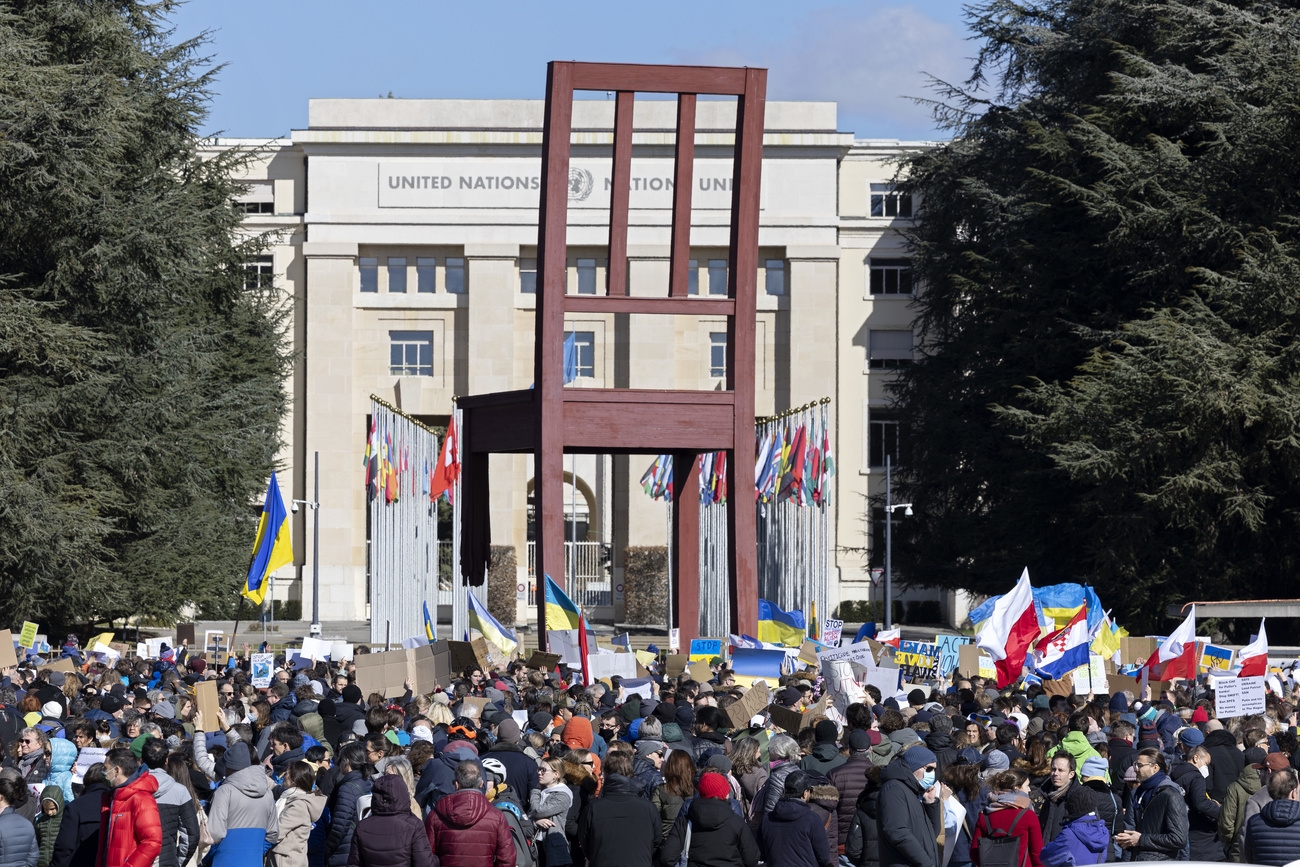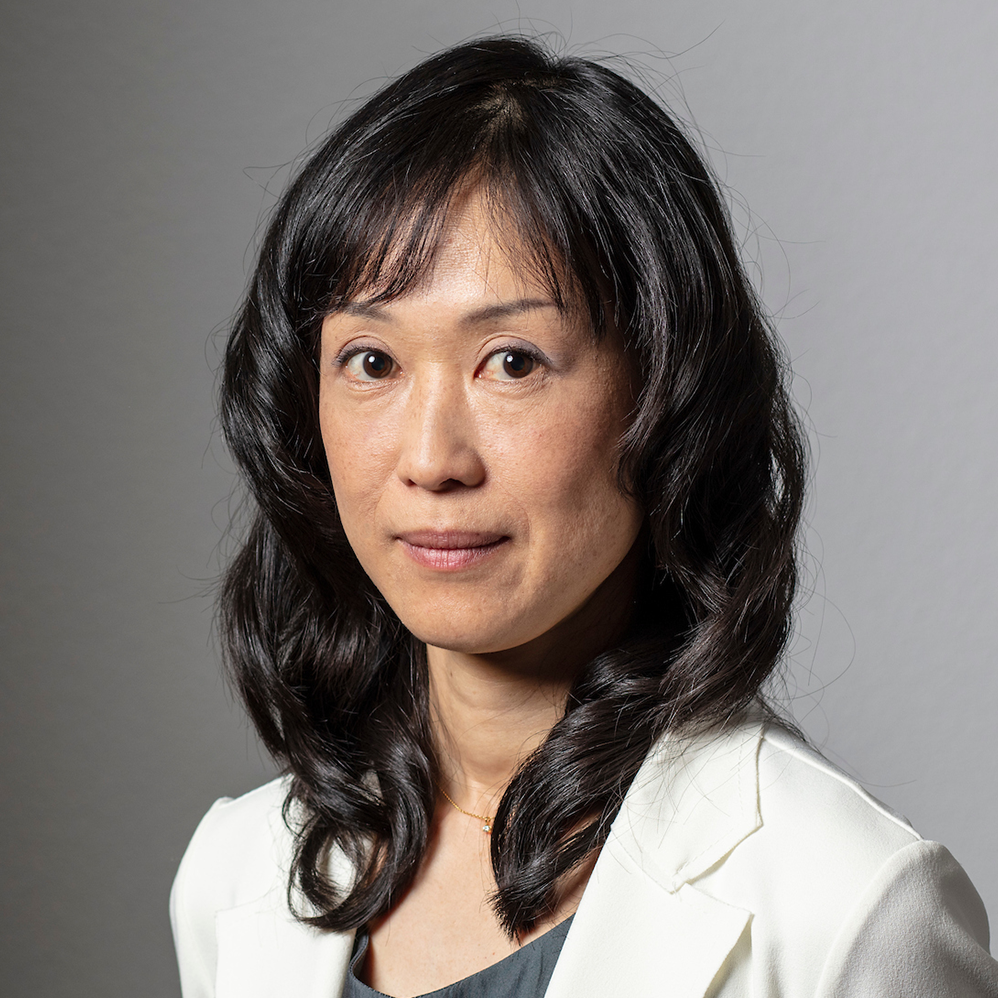
International Geneva caught in the crossfire of the Ukraine war

It has been a year since Russia invaded Ukraine on February 24, 2022 and there is still no sign of an end to the conflict. International organisations in Geneva are in a dilemma over whether to isolate Russia in a bid to increase pressure on Moscow to stop the war.
The war in Ukraine has changed the diplomatic approach within international organisations based in Geneva. While advancing their own agenda to tackle global health or refugee issues, member states of some of these bodies have been preoccupied by the conflict. Some have even sought to exclude Russia. Ukraine, backed by US-led anti-Russia bloc of Western countries, continues to pressure Russia and to politically isolate it in international negotiations.
In Geneva, the European Organization for Nuclear Research (CERN) suspended collaboration with Russia last March and the UN Human Rights Council (HRC) expelled Russia last April. Last September Russia lost out in the election for Secretary-General of the International Telecommunications Union (ITU) with the US candidate Doreen Bodgan-Martin winning the top job instead. Even environmental organisations were affected by geopolitics: Discussions during the annual meeting of members (CoP) of the Ramsar Convention on Wetlands last November witnessed condemnationsExternal link of Russia’s aggression in Ukraine.
“Diplomatic isolation of Russia – a tricky strategy in International Geneva”
Bathsheba Nell Crocker, US ambassador to the United Nations in Geneva, thinks that “the international community has united, not only here in Geneva but in every other multilateral setting, to forcefully condemn Russia’s brutal invasion of Ukraine.”
She adds “Russia finds itself isolated on the world stage, as its actions have rightly been seen as a clear breach of everything it purports to stand for as a signatory to the UN Charter.”
Crocker’s British counterpart, Simon Manley, has the same impression, and he explains that “after years of pushing the boundaries from Crimea to Salisbury, President Putin has finally paid the price for his flagrant flouting of the UN Charter”.
“If you walk around multilateral Geneva today, you will find that Russia’s ability to conduct multilateral diplomacy has been severely constrained, ” says Manley about the stripping of Russia’s privileges in international organisations in Geneva.
But not everyone supports this strategy of isolation. China says it continues to uphold “an objective and impartial position”. Ambassador Chen Xu tells SWI swissinfo.ch that China “will continue to work with all peace-loving countries to advocate the resolution of conflict through negotiations and the settlement of disputes through consultations”.
“Resolving the crisis in Ukraine through political means is in the best interest of the countries concerned, and in the common interest of all countries of the world,” Chen adds.
Friends of Ukraine
Last November, in an agriculture committee meeting at the World Trade Organization (WTO), Ukraine and a group of self-proclaimed “friends of Ukraine” (the United Kingdom, Norway, Canada, Japan, Australia, the European Union, Iceland, and Switzerland) blamed Russia for being “solely responsible for the severe food insecurity across the world.”
This kind of statement was regarded by some as counterproductive. In fact, the UN had warned of severe food insecurity and even possible famine due to the drought in the Horn of Africa or in Madagascar well before Russia’s invasion.
A trade official admitted to SWI that such political pressure, and the harsh tone of the negotiations by the West is “not as strong as before”, amid fears too much pressure could jeopardise the Black Sea Grain Initiative.
The Initiative aims to facilitate the export of Ukrainian and Russian grain and fertiliser (vital to food supply and production across Africa) including from the Black Sea ports, which have been blockaded by Russian military vessels and mined by Ukraine. The official speculates that there may have been some concerns that Russia’s agreement to the Black Sea Grain Initiative could be affected if the West pushes Moscow “too much”.
Not all organisations, member states and experts agree on how much political pressure should be exerted on Russia to stop the war. Now that the war is a year old, and shows no end in sight, some international organisations in Geneva that traditionally operate by consensus face a growing dilemma.
Russia’s perception
“The main and most disturbing current problem for multilateral diplomacy in Geneva is the excessive amount of politicisation of work at the UN and other international organisations here that was introduced by the US, its Western allies and Ukraine,” Russian ambassador Gennady Gatilov tells SWI.
“Instead of addressing pressing issues that fit their specific mandates and are of paramount importance to the entire world, a lot of time is wasted during the meetings on discussing the Ukrainian crisis,”, says Gatilov. He raises the example of the ITU, which according to him, does not have a mandate for discussing political topics.
“Squabbles on political issues that are neither within the mandate or agenda of the international organisations in Geneva severely hinders their efficiency,” he argues.
Sports ban and backlash
At the same time, UN human rights experts have intervened in the debate over Russian athletes’ participation in international sporting competitions.
Last September, special rapporteurs of the Human Rights Council criticised the International Olympic Committee (IOC) for imposing bans on Russian and Belarusian athletes.
“We express serious concern about the recommendation to ban Russian and Belarusian athletes and officials such as judges from international competitions, based solely on their nationality, as a matter of principle. This raises serious issues of non-discrimination,” the rapporteurs stated in a letterExternal link sent to the Head of the IOC.
They suggested a ban could constitute a violation of human rights. But many member states believe such a ban would send another strong signal to Moscow. The IOC President Thomas Bach is now caught between the different opinions of member states and human rights defenders. The Olympics body is currently having in-depth debates on whether to reinstate athletes from Russia, and its ally Belarus, on the condition that they are “neutral” and do not use their national flags or anthems.
Bach said in January 2023 that he did not want to ban the athletes from competing “solely on the basis of their passports”. Bach warns the politicisation of world sport is “dangerous” and argues that excluding only Russian or Belarusian athletes from the Olympic Games and not other countries affected by war, like Yemen, Iraq or Libya cannot be justified.
Next challenges
Jürg Lauber, Swiss ambassador to the UN and other organisations in Geneva, considers that “the war in Ukraine has added to a series of conflicts and crises that have a strong impact on the work of diplomats and the activities of international and especially humanitarian organisations based in Geneva.”
“The need to respect international law and the desire for right to prevail over might has grown even stronger,” says Lauber.
French ambassador Jérôme Bonnafont believes that the war in Ukraine has presented Geneva with “a triple necessity”.
“The first is to condemn Russia’s actions and ensure that the crimes committed will not go unpunished. This is the role of the Human Rights Council. Second, support Ukraine so that it can overcome the tragic consequences of this war on the economic and humanitarian level. Third, maintain the multilateral system by ensuring that the efforts devoted to this war do not divert us from our other missions,” he says.
For Russia’s ambassador, the main challenge for International Geneva is “to make the “collective West” realise that there is a right time and place for everything”. Gatilov thinks that discussions on Ukraine should be brought before the UN General Assembly or the UN Security Council, not before specialised agencies like the International Labour Organization or the World Intellectual Property Organization.
“Geneva and the UN as a whole has to once again become a neutral and impartial international platform focusing on the ways to address the world’s pressing issues instead of settling political scores,” says Gatilov.
All the ambassadors contacted by SWI agree that other urgent issues facing the world should not be neglected.
Since the war is ongoing, these discussions among multilateral organisations in Geneva will continue.
A sad anniversary
February 24, “it is a sad anniversary,” mourns Alessandra Vellucci, the Director of the United Nations Information Service in Geneva. “In addition to the suffering of the Ukrainian people, the war in Ukraine has had profound global implications on global food and energy prices, trade and supply chains, nuclear safety and on the foundations of international law.”
According to her, the war in Ukraine has also had a big impact on the day-to-day work of the United Nations.
“The UN is working relentlessly, particularly in organising and supporting humanitarian operations and facilitating exports of food and fertilisers from Ukraine and Russia, with many of these operations supervised and implemented by Geneva-based UN agencies.”
Amid all the diplomatic and political strategies related to the war in Ukraine, the UN’s humanitarian arm has been doing its job. In Geneva, the world’s humanitarian hub, multiple international organisations continue to work incredibly hard to support the victims of war and assist large numbers of refugees.

In compliance with the JTI standards
More: SWI swissinfo.ch certified by the Journalism Trust Initiative































You can find an overview of ongoing debates with our journalists here . Please join us!
If you want to start a conversation about a topic raised in this article or want to report factual errors, email us at english@swissinfo.ch.